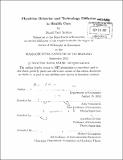Physician behavior and technology diffusion in health care
Author(s)
Molitor, David Paul
DownloadFull printable version (8.661Mb)
Other Contributors
Massachusetts Institute of Technology. Dept. of Economics.
Advisor
Amy Finkelstein and Jonathan Gruber.
Terms of use
Metadata
Show full item recordAbstract
Chapter 1 examines geographic variations in physician practice styles by exploring the role of physician-specific factors such as preferences and learned behavior versus environment-level factors such as hospital capacity. I exploit cardiologist migration across geographic regions and find that physicians who start off in the same region and subsequently move to dissimilar regions practice similarly before the move but very differently after the move. Based on this change in behavior, baseline estimates imply that the role of the environment on physician behavior is twice as important as physician-specific factors. Specifically, a one percentage point change in practice environment results in an immediate 2/3 percentage point change in physician behavior, with no further changes over time. Chapter 2 (co-authored with Leila Agha) explores the diffusion of new cancer drugs by testing the influence of physician investigators who lead clinical trials. The basic idea is to exploit variation across drugs in the location of clinical trials to test whether geographic proximity to a principal investigator influences the speed of technology adoption. Using original data on clinical trial study authors and sites for 21 new cancer drugs along with Medicare claims data from 1998-2008, we estimate that patients are 30% more likely to receive treatment with a new drug if they seek care in the hospital referral region where the drug's principal investigator practices. This effect, which is estimated in the first two years following initial FDA approval, fades over time until there is no apparent difference in utilization after four years. Chapter 3 (co-authored with Leila Agha) explores the prescribing of new cancer drugs for off-label (non-FDA approved) indications, yielding three key results. First, over 20% of new cancer drug use within the Medicare population over 1998-2008 was applied to off-label cancers. Second, geographic proximity to the principal investigator of a drug's pivotal clinical trial-a factor which appears to significantly boost on-label usage-has no discernible impact on off-label prescribing. Third, we find that prescribing increases following FDA approval expansions, suggesting that approval status influences patient treatment and thus may provide a useful policy instrument for directing medical technology adoption.
Description
Thesis (Ph. D.)--Massachusetts Institute of Technology, Dept. of Economics, 2012. Cataloged from PDF version of thesis. Includes bibliographical references (p. 127-132).
Date issued
2012Department
Massachusetts Institute of Technology. Department of EconomicsPublisher
Massachusetts Institute of Technology
Keywords
Economics.